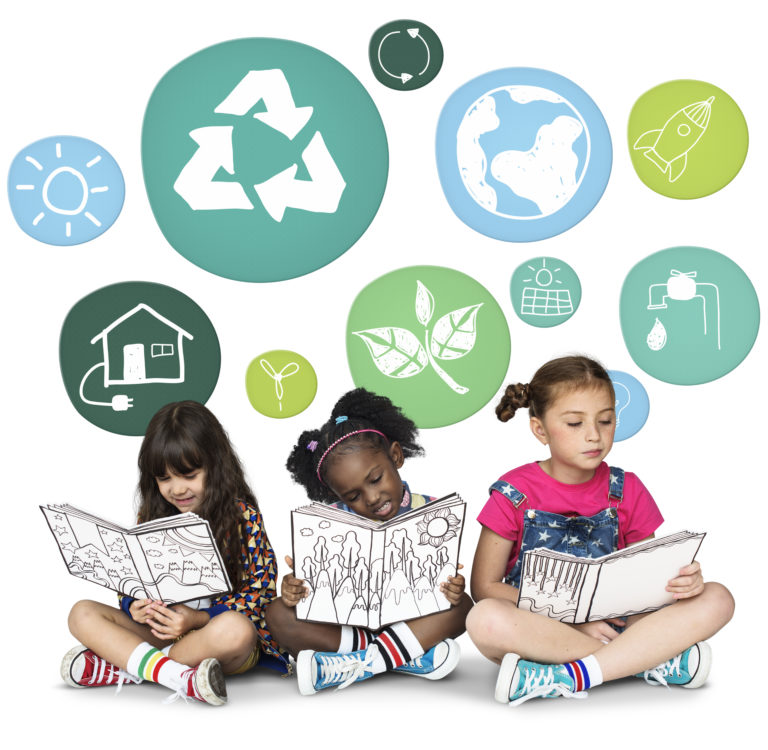Concern for the environment is a crucial family value that many parents hope to instill in their children. But how exactly can we stimulate young ones to develop an environmentally conscious mindset and habits? I gained some insights from Encouraging Parents, Courageous Children, a new book by Betty Lou Bettner, Ph.D. In her book, Bettner notes that all children are motivated by “4 C’s.” They want to connect with others, feel capable, know they count and feel courageous enough to deal with challenges. Bettner’s concept suggested four simple ways parents can encourage children to follow in their eco-friendly footsteps.
1. Provide Connection
Just as connection with a parent can help a child feel secure, loved and grounded, connection with the natural world can also help a child’s healthy development. According to HealthyChildren.org, outdoor play is linked with improved motor development and lower obesity rates. And being in the sun in a safe way can support children in getting the vitamin D they need. In addition, less anger and aggression are found in children when they spend time outdoors. Impulse control improves, and children exhibit more focus and less symptoms of Attention Deficit Hyperactivity Disorder (ADHD).
- Incorporate outdoor time wherever you can. Take a walk to a park. Organize family picnics. Toss a frisbee or throw a ball outside. Being outdoors as a family refreshes everyone.
- When you are working outdoors – raking, shoveling, sweeping, or planting – invite your child to work or play alongside you. When celebrating your child’s birthday, consider asking if she’d like to celebrate by having a bike ride, a hike, a park visit or a swim day in a lake or at a seashore. Allow time for children to pause, rest and be still outside, as this can be as nourishing as exercise and physical activity.
As children spend more time outdoors, they will begin to care more for nature, as nature cares for them. Trees give children a place to climb and find shade on a hot day. Rivers and streams invite them to take off their shoes and wade or catch frogs. Lakes offer the chance to swim, boat, and ice skate. Watching bugs, squirrels, birds and other wildlife gives children continuous opportunities to observe new worlds and many occasions to witness natural cycles of life and loss. As they connect with nature and benefit from what it has to offer, children will identify the outdoors as their natural home and will want to care for it.
2. Walk the walk, and invite help
Young children are excellent observers. What they observe us doing can often be more influential than what they hear us telling them to do! When a child shows interest in something you are doing to care for the environment, seize the moment and invite their help. When they see you pick up a piece of trash at the park, ask them to partner with you and soon they will instinctively pick up trash when they see it.
- Think of ways your child could join you in participating in whatever form of recycling is available in your community. That may mean going for a ride to the recycling center with you, gathering all the recycling in the home on a weekly basis, or being the one who reminds the family to put recycling items in the household bin at the end of each meal.
- If you don’t currently compost, investigate composting options in your community. As your child asks you about it, invite her to participate by bringing scraps to a compost pile in your community or, if your jurisdiction provides commercial composting, bringing your compost bin to the curb.
- Let your child see you purchase used items – whether at thrift stores, through online thrifting or through community exchanges – and be open to discussion about how these purchases keep items out of landfills.
When you are at the store purchasing cleaning products, invite your child to help you locate the eco-friendly ones. When children participate in these ways, they learn that they are capable of caring for the world around them.
3. Let your child see their efforts count
As your child grows older, help him to see what a difference his actions make in the larger community. Notice and express appreciation when you see him making an earth-friendly decision. Support your child’s participation in community cleanup days, during which local groups work together to pick up trash along a road, in a park, or along a shoreline. These cleanup days sometimes involve volunteers who work together to remove invasive species of plants.
Consider participating in a chapter of Roots and Shoots , a youth action program of the Jane Goodall Institute, where your child can team up with a group of other committed children. By connecting with larger groups, children get a sense of the impact of their work and gain inspiration from others.
4. Foster Courage
Children who are raised to connect with nature feel capable of supporting it, and know that their efforts count are likely to develop into teens and young adults with the courage to be good stewards of the environment, even if that means going against the grain of society. Courage will be required to meet the many challenges they are likely to encounter. It may mean choosing to ride their bike to school rather than relying on motor transportation. It may mean voicing their opinion in their school to support more sustainable practices in the cafeteria. Courage may mean educating their peers to exercise their vote to support environmental causes. It may involve participation in a peaceful demonstration to protest dumping of chemicals in our waterways. And courage will certainly mean not giving up hope in the face of increasing environmental challenges.


